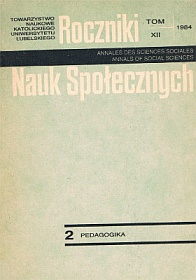Some of the Problems of Transactional Analysis
Abstract
Transactional analysis was developed in the late 50s by an American psychiatrist and psychoanalyst Eric Berne. It constitutes one of the first attempts to synthesize several theories into one coherent theory. It kames use of the theoretical assumptions of psychanalysis, individual psychology, the theory of roles, the theory of learning, and humanistic psychology. All the elements taken from various theories are interpreted here in a different way.
In the theoretical assumptions of this analysis it is accepted that in the biological nature of man there function three significant needs. These needs start to function also in man’s psychic nature along with the development of the organism. These arc: the need to entertain stimulation, the need of support, and the need of the structuralization of time. The structure of man’s personality is formed on the basis of those needs. The manner and quality of satisfying the needs significantly influences the formation of man’s emotional attitude towards himself and to his social environment.
The range of problems pertaining to transactional analysis is very wide and includes the analysis of man’s personality structure, interpersonal transaction. It helps to find out and understand the way in which interhuman conflicts begin and, possibly, solve them out. Besides, transactional analysis studies „the games people play“ in their social and occupational roles. It also analyses one’s life record, i.e. the history of one’s life. It devotes much its interests to therapy, and aims at making man capable of experiencing his own autonomy, and excite in man a sense of responsibility for his own development.
Copyright (c) 1984 Roczniki Nauk Społecznych

This work is licensed under a Creative Commons Attribution-NonCommercial-NoDerivatives 4.0 International License.


